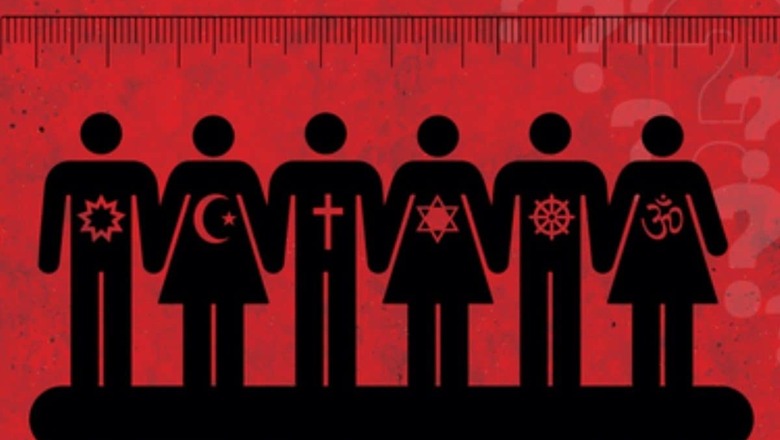
views
The Law Commission is currently seeking responses from individuals, institutions and various organisations on the Uniform Civil Code (UCC). The UCC has long been a matter of politically charged debate in India. Various perspectives have arisen out of this polarising dialogue. Some see it as a reformatory step for uplifting women and unity of the country, and some see it as a divisive ploy against secularism. Amidst this chaos, it is vital to have a pre-supposition-less inquiry into the nature of the UCC and what job it gets done.
Constitutional Ethos
Article 44 in Part IV of the Constitution advocates, “The State shall endeavour to secure for the citizens a Uniform Civil Code throughout the territory of India.” The UCC was intentionally made a part of the Directive Principles, making it a guideline and not an obligation on the newly formed Indian state to ensure social stability after the bloody partition. However, the framers of the Constitution envisioned it to be a standard collection of rules, that would replace the personal religious laws governing aspects like marriage, divorce, adoption and inheritance. The framers of the Constitution were also mindful of keeping Personal Laws under the Concurrent List, taking cognisance of the diverse cultural milieu of India.
Early Hesitation
Early efforts towards creating such standard rules, in the form of the Hindu Code Bill, received strong opposition from religious groups. Consequently, the Hindu Code Bill was separated into four laws — the Hindu Marriage Act, the Hindu Succession Act, the Hindu Minority and Guardianship Act, and the Hindu Adoptions and Maintenance Act. This early agitation against the uniformity of personal laws of the majority community discouraged the Executive from tweaking the personal laws of the minority. Post-independence, India wanted to portray its democratic ethos and secularism, and the religiously charged protests did not align with this goal.
Judicial Assent
Apart from the Executive’s push, the need for UCC organically emerged in the various Supreme Court judgements, like Mohd. Ahmed Khan vs. Shah Bano Begum, 1985; Sarla Mudgal, & Ors. Vs. Union of India, 1995; and Paulo Coutinho vs. Maria Luiza Valentina Pereira, 2019, where it called upon the government to implement the UCC. All these cases had a common underlying theme: the Personal Laws contravened Fundamental Rights under Part III of the Constitution. Article 13 states that “laws in force” are void to the extent of their inconsistency with the Fundamental Rights provisions under Part III. But the Constitution is silent on whether the Personal Laws, existing long before independence, are covered under this term. This silence has caused many age-old religious practices to continue, negatively impacting certain sections of our society based on gender and caste.
Indian Secularism
Social reform is deeply entrenched within Indian society. Social reformers like Raja Ram Mohun Roy, Ishwar Chandra Vidyasagar, Syed Ahmed Khan, and many more reformed entrenched age-old practices even under colonial rule. This spirit of social reform was carried into the constitutional framework through the Indian notion of secularism. KM Munshi, a member of the Constituent Assembly, noted that the Constitution allowed making laws covering secular activities related to religious practices if intended for social reform.
These foundations clearly indicate that Indian secularism has an element of reformatory justice to it. The abolition of untouchability under Article 17 and throwing open Hindu religious institutions of a public character to all classes and sections of Hindus clearly reflects the transformational nature of Indian constitutional secularism. Further, Article 25 of the Constitution states that the State can enact laws to regulate secular activity associated with religious practice. However, a question still lingers, whether the UCC inspired by this constitutional ethos and Indian secular perspective be a push for national unity or blatant homogeneity?
Job To Be Done Perspective
From the above discussion, it is clear that a UCC can lay to rest the question about the primacy of Fundamental Rights over Personal Laws, deepen the democratic-secular ethos of India and act as a transformative policy for those sections of the society which are aggrieved by age-old religious practices. One such section is women of certain religious denominations who currently do not enjoy equal coparcenary rights. These women also do not get the rightful share in their deceased husband’s property. Another group is women who are victims of arbitrary divorce. The recent Supreme Court judgement in the Shayara Bano vs. Union of India, 2017, declared the practice of triple talaq unconstitutional, resulting in reformatory legislation from the Parliament.
For these aggrieved groups, age-old Personal Laws infringe upon their fundamental rights. In the absence of a UCC, they have to approach the judiciary. The Indian courts have given justice to such groups, but two issues arise here. Firstly, courts decide these matters on a case-to-case basis, leaving out a larger societal impact unless some reformatory judgement is received from the higher judiciary. Secondly, the Indian higher judiciary has huge backlogs of around 49 lakhs in the High Courts and 58,000 in the Supreme Court. Additionally, these litigations cost a fortune and could be taken forward by a select few.
The job-to-be-done notion can be applied to the UCC from the perspective of the aggrieved groups. A UCC’s job to be done then would be to safeguard the Fundamental Rights of such aggrieved individuals and groups. It can create an ecosystem of constitutional morality to guide the secular activities of religious practices by standardising coparcenary rights, inheritance rights, marriage and divorce proceedings throughout the country. This would safeguard the Fundamental Rights under Articles 14 and 15 of the aggrieved without infringing upon religious freedoms under Articles 25 to 28 of the Constitution. Additionally, the Parliament can create guiding legislation under entry 5 of the Concurrent List. By doing this, the diverse practices across states of a religious denomination can be accommodated.
Way Forward
India is a civilisational society with modern state machinery. We Indians have solemnly resolved to ensure justice, liberty, equality and the promise of fraternity to all. Whatever the outcome of the Law Commission’s exercise of eliciting public opinion on UCC, we Indians have a duty to discuss, debate and deliberate upon these self-governance issues in a true democratic spirit. What matters most is the process of deciding for or against a UCC in India. And through that process, India takes a step towards becoming a strong democracy.
Divya Singh Rathore, a public policy professional. She tweets at @_divyarathore; Suryapratap Babar, a Public Policy researcher. He tweets at @SuryapratapBab3. Views expressed in the above piece are personal and solely that of the author. They do not necessarily reflect News18’s views.




















Comments
0 comment